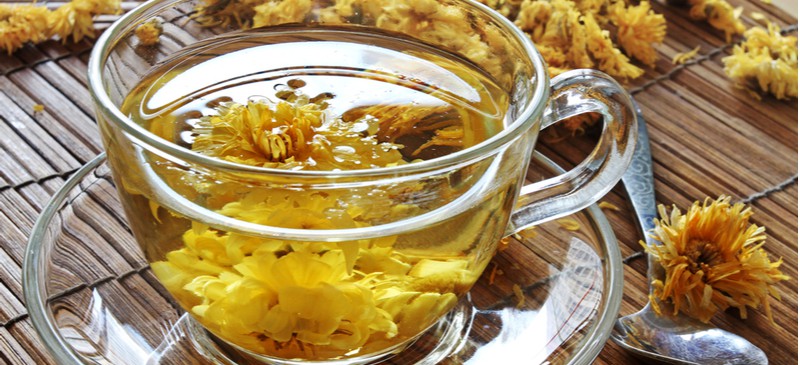
Mums may remind you of autumn gardens, but did you know that chrysanthemum tea has been consumed in Asia for hundreds of years? If you love drinking dandelion tea for its antioxidant properties, you may want to give “mum flower tea” a try, too.
This pleasant, aromatic tea is made from the flowers of the chrysanthemum plant, and it’s been used in Chinese medicine to treat a range of conditions, from migraines to hypertension and throat inflammation.
As it grows in popularly, chrysanthemum tea is being evaluated by researchers for its antioxidant activity. The flowers have proven to possess an impressive phytochemical composition that can potentially boost your overall health.
What Is Chrysanthemum Tea?
Chrysanthemum indicum is a perennial herb that belongs to the Asteraceae family. The chrysanthemum, or mum, plant has been used in Traditional Chinese Medicine (TCM) for centuries, and it’s been valued for its health-promoting properties. It’s a folk remedy to treat headaches, bone disorders and insomnia.
Today, mum flower is used to make therapeutic tea that fights inflammation and promotes relaxation. It has a slightly sweet, floral taste, which has been likened to chamomile tea. There are several varieties of the plant, but yellow chrysanthemum is the most popular for making tea. Other varieties include red chrysanthemum, purple chrysanthemum and white chrysanthemum.
Tea made from chrysanthemum flowers have proven to possess powerful antioxidants with strong free radical scavenging effects. Studies also demonstrate that the plant contains various types of flavonoids, phenolic acids and lignans.
History in TCM
In traditional Chinese medicine, chrysanthemum tea is known for its cooling and calming properties. It’s used to reduce a fever and improve cold or respiratory symptoms. It’s also reported to possess anti-inflammatory, sedative, anti-hypertensive and anti-arthritis effects.
“Ju hua,” as it’s known in Chinese, has an impressive nutrient content that’s known to support liver, skin and eye health, with the presence of vitamin A and beta carotene. It also contains B vitamins, vitamin C and bone-strengthening minerals including calcium, magnesium, iron and potassium.
In traditional Chinese medicine, mum tea is used to promote liver and kidney health. It serves as a natural diuretic and helps to cleanse the body of toxins. It also provides antioxidants that promote healthy aging. For these reasons, it’s a well-known tea in this ancient form of medicine.
Related: 6 Anti-Inflammatory Teas to Begin Drinking Today
Health Benefits
Although there is limited scientific evidence on the benefits of chrysanthemum, researchers have found that it possesses health-promoting properties in animal and lab studies. Chrysanthemum leaves benefits are known from anecdotal reports in Chinese medicine, as it’s been used therapeutically for centuries.
1. Antioxidant
Chrysanthemum tea contains a high content of anthocyanins, which are known as powerful antioxidants. A 2019 study published in Food Research International found that chrysanthemum flower has antioxidant and anti-inflammatory mechanisms.
And when researchers analyzed 17 commercial chrysanthemum teas that were extracted with hot water, they found that all extracts suppressed oxygen species production in lab cells. These results show that mum flower has powerful antioxidant properties and can be used as a functional tea.
READ RELATED: Use Antiviral Herbs to Boost Immune System and Fight Viruses
2. Boosts Heart Health
Although research on this topic is limited, a study conducted on rats shows that chrysanthemum morifolium possesses cardioprotective effects on restricted blood vessels and oxygenation to the brain.
In TCM, extracts from this plant are also used to improve hypertension. And research on chrysanthemum essential oils indicate that inhalation can reduce blood pressure and heart rate.
3. Promotes Relaxation
In Chinese medicine, this plant is known for its sedative properties. One study on mice suggests that chrysanthemum extract has anti-anxiety effects and facilitates relaxation. This may be caused by the plant’s effects on GABA and serotonin receptors.
4. Supports Bone Health
When researchers investigated the effect of mum extract on osteoclastic and osteoblastic cells, which are responsible for the breakdown and remodeling of bones, they found that it has beneficial effects.
In this lab study, chrysanthemum was able to inhibit cells that breakdown bone and enhance cells that rebuild bone. This reveals the potential therapeutic role of mums in bone-related disorders.
In addition to these potential benefits, centuries of anecdotal reports suggest that chrysanthemum tea may also:
- improve respiratory conditions
- reduce fever
- promote detoxification
- support vision and eye health
- boost energy
How to Make
You can make your own organic chrysanthemum tea with flowers you’ve grown yourself or blooms you’ve purchased. If you’re using flowers grown at home, make sure they haven’t been sprayed with pesticides or any other chemicals.
First, they need to be cleaned thoroughly and dried for several days. Then follow these steps to make mum flower tea:
- Boil water and let it sit for one minute or until it’s about 100 degrees Fahrenheit.
- For every 8 ounces of water, add 3–6 whole mum flowers.
- Let the flowers steep for about five minutes (until water becomes golden yellow).
- Strain flowers.
- Add sugar substitutes, like honey or stevia, if preferred.
Cold brew chrysanthemum tea is also delicious and just as beneficial. Simply pour your brewed tea into a pitcher and store it in the refrigerator.
Risks and Side Effects
It is possible to have a chrysanthemum allergy, which may cause skin reactions like redness, swelling and itching. If you experience any of these chrysanthemum tea side effects, stop consuming the beverage.
If you’re on medications that suppress the immune system, speak to your doctor before using chrysanthemum tea therapeutically. There is not enough evidence to recommend long-term, therapeutic use of this plant tea, so consult your healthcare provider if you plan to use it to improve any health condition.
Using mums therapeutically is not recommended for women who are pregnant because there is not enough evidence of its safety.
Final Thoughts
- Chrysanthemum tea is made from the mum plant and has been consumed for centuries for its health-promoting properties.
- Although research on this plant is pretty limited, animal and lab studies show that it’s rich in powerful antioxidant and may be able to boost bone and heart health. It also has relaxing, sedative properties and works to reduce cellular oxidation.
- You can easily make your own tea by steeping mum flowers in below boiling water for about 5 minutes.
Source: Dr. Axe | Nutrition






